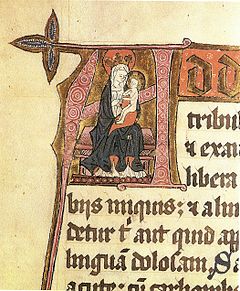|
Psalm 120
Psalm 120 is the 120th psalm of the Book of Psalms, beginning in the English of the King James Version: "In my distress I cried unto the LORD, and he heard me". In the slightly different numbering system used in the Greek Septuagint and Latin Vulgate translations of the Bible, this psalm is Psalm 119. In Latin, it is known as "Ad Dominum cum tribularer clamavi".[1] It is one of 15 psalms categorized as Song of Ascents (Shir Hama'alot). The psalm forms a regular part of Jewish, Catholic, Lutheran, Anglican and other Protestant liturgies. It has been set to music in several languages. TextHebrewThe following table shows the Hebrew text[2][3] of the Psalm with vowels alongside an English translation based upon the JPS 1917 translation (now in the public domain).
King James Version
Verse 5
"Woe is me" is a typical expression of despair. Meshech and Kedar (or Qedar) were "typical enemies [of Israel], who forced their way into the kingdom of Judah and vexed the people of God".[5] UsesJudaismThis psalm is recited in some communities following Mincha between Sukkot and Shabbat Hagadol.[6] Catholic ChurchAccording to the Rule of St. Benedict set in 530, this psalm was sung or recited during the third office during the week, namely from Tuesday until Saturday, followed by Psalm 121 (120) and Psalm 122 (121) and after the offices of the Sunday and Monday were occupied with Psalm 119, which is the longest among the 150 psalms.[7] In the Liturgy of the Hours, Psalm 120 is now recited in Vespers on the Monday of the fourth week of the four weekly liturgical cycle. OtherAt the Palazzo Bocchi in Bologna, an inscription on the facade quotes verse 2 in Hebrew. Musical settingsWilliam Byrd set the psalm to eight voices, with minor variations in the text. The music is found in a 1578 manuscript of polyphony. Heinrich Schütz wrote a setting of a paraphrase of the psalm in German, "Ich ruf zu dir, mein Herr und Gott", SWV 225, for the Becker Psalter, published first in 1628. Giacomo Giuseppe Saratelli set it is one of his 150 psalm settings in Latin, for choir, orchestra and basso continuo. References
External linksWikisource has original text related to this article:
Wikimedia Commons has media related to Psalm 120.
|
||||||||||||||||||||||||||||||||||||||||||||||||||||
